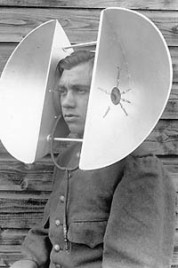“Fleecing” tests are more likely to lead us to our own will than God’s.
Praying for a Sign
In the movie, “Bruce Almighty,” Bruce, played by Jim Carrey, prays for God to reveal His will to him. What follows is a series of  scenes in which God is clearly trying to communicate with him, but Bruce obliviously dismisses each attempt as unrelated coincidences, all the while growing more irritated that God has not responded.
scenes in which God is clearly trying to communicate with him, but Bruce obliviously dismisses each attempt as unrelated coincidences, all the while growing more irritated that God has not responded.
If it were not for Carrey’s comic brilliance, these hilarious scenes might be more agonizing than amusing, for they depict a little too realistically the human struggle to hear and understand an invisible God.
Unlike in the movie, God does not page us to meet Him in person and thumb through His private files or stand on the street corner with signs.
So how, then, are we to know His will?
First, let’s look at a popular method that may teach us more about how NOT to know the will of God than how to know it.
Fleecing God
Gideon said to God, “If you will save Israel by my hand as you have promised—look, I will place a wool fleece on the threshing floor. If there is dew only on the fleece and all the ground is dry, then I will know that you will save Israel by my hand, as you said.”
And that is what happened.
Then Gideon said to God, “Do not be angry with me. Let me make just one more request. Allow me one more test with the fleece, but this time make the fleece dry and let the ground be covered with dew.”
That night God did so.
(Judges 6:36-40)
Gideon’s tests have become a popular model for discerning God’s will, particularly when trying to decide between two seemingly equal options.
“If they call in the next 30 minutes…”
“If I blindly open my Bible to a random verse…”
“If the next car that passes is silver…”
This method has the guise of giving God control, but there are some serious flaws.
1 | God’s will does not need confirmation.
This is not always the case, but often, God’s will is clear enough and needs no confirmation.
This was certainly the case for Gideon. God had already directly commanded him to attack and explicitly guaranteed victory (Judges 6:14, 16).
Notice Gideon’s statement to God:
“If you will save Israel by my hand AS YOU HAVE PROMISED…”
He knew the command and the promise; all he needed was faith, courage and obedience.
God has made His will for us more plain than we give Him credit for, most especially in His Word. We can’t, therefore, claim ignorance or blame vague or incomplete revelation.
If God has already said it, the commands and promises can be believed and acted upon without further confirmation.
2 | The test may reveal more about OUR will than God’s.
 Gideon’s fleecing test was not, as many view it, a humble way to confirm God’s will but a cowardly way to question His faithfulness and/or competence.
Gideon’s fleecing test was not, as many view it, a humble way to confirm God’s will but a cowardly way to question His faithfulness and/or competence.
The issue was not, “Should I attack?” It was, “If I attack, will You keep Your promise?” and, “Can You really win?”
We may not like to admit it, but our own tests to “discern God’s will” may only be indicators that we don’t want to do what He has said.
Jim Cymbala tells of a woman who said she was so convicted by his sermon that she was going to pray about possibly leaving the boyfriend with whom she was living. Cymbala’s response was to quit praying and start packing. “You don’t have to pray about things God has already called sin!”
Leaving sin for righteousness is always God’s will. No confirmation needed. Taking time to pray about it does not prove our hearts are openly and obediently seeking God’s will but that they are stubbornly committed to our own.
3 | The test is rigged.
Gideon tested God once and had his answer. Why test again, and this time a more difficult task?
He was doing what we often do: rig the test to give us the outcome we want.
… Like plucking the pedals of a dozen daisies until one finally ends with “He loves me!”
… Like flipping through countless random verses until one is found that confirms what we’ve already decided to believe.
… Like seeking counsel from multiple people until one finally supports and helps justify what we want to do.
This example from Gideon is not meant to be a model we imitate for making decisions. God was graciously patient with Gideon and did play along, but as a rule, “fleecing” tests are more likely to lead us to our own will than God’s.
Four Questions for Deciding If You’ve Heard from God
So how do we distinguish God’s will from our own?
When we think we’ve heard from God–Scripture that could be applicable to your specific situation; advice or input from someone; an impression or feeling; a dream; a “sign;” maybe even a response to a fleecing test–how can we be sure it is indeed God’s will we’ve heard?
Margaret Feinberg suggests four questions to ask about the “revelation”:
(Read her full blog here.)
1 | Does what I heard line up with Scripture?
“The Bible serves as bedrock, determining whether or not something is from God. If you feel led to do something that goes against the teachings of Jesus or the principles of Scripture,”–all of Scripture, not just a verse or two manipulated into a meaning that contradicts the more general principles throughout Scripture–“then what you’re hearing isn’t from God.”
2 | Does what I heard line up with wise counsel?
“Look for mentors in your life who can provide wisdom concerning your finances, relationships, marriage, career, and faith. Over the years I’ve discovered that one mentor isn’t enough. God speaks through a community.”
While some are best equipped to counsel concerning marriage or discipleship or finances, “all of them share common characteristics: they love God and long to see us grow in the fullness of who God created us to be; they pray for us; and they respond with honesty and grace.”
When you think you’ve heard from God, run it by these wise, godly counselors and be willing to be teachable.
3 | Does what I heard leave me with a sense of peace?
 Moments of decision often come with a wide range of emotion: fear, joy, anxiety, enthusiasm, sadness. These can compel rash responses that we may regret later.
Moments of decision often come with a wide range of emotion: fear, joy, anxiety, enthusiasm, sadness. These can compel rash responses that we may regret later.
Unless we wait for peace.
Peace of mind, peace of heart, peace of conscience, these can be a sign that God has ordained what we’ve heard, while a restless mind or unsettled conscience can be God’s way of warning us we’re moving in the wrong direction.
4 | Is what I heard blanketed in love?
Tamara recently told me of a person we know who was ugly to her in a restaurant, snapping at her about the happy noises one of the SIX kids she had with her was making. I have his phone number and began mentally drafting texts to set him straight.
Afterall, aren’t I her God-given protector?
Wasn’t my anger a righteous anger?
Doesn’t Christ fight for and avenge His Bride, the church, an example I was prepared to follow?
It would be easy to assume these rationalizations were from God, but I knew they were not because they lacked the brand mark of love.
Knowing I could not respond in a loving way while so angry, I promised Tamara (and God) not to confront him until I could.
Feinberg wisely states:
“The nature of God’s voice is that it calls us to maturity in love, nurturing the fruit of the Spirit in our lives. If love is protecting our actions and decisions, then we’ll be restrained from making grievous errors.”
How Do You Know?
So how do you discern God’s will?
If you are a disciple, then knowing what He desires in major decisions and everyday situations is your greatest priority.
Ours, too!
So please leave a comment to share what has been most helpful for you to determine it.
Cymbala, Jim. You Were Made for More. (Zondervan: Grand Rapids), 2008. p. 49
Margaret Feinberg. “4 Questions to Ask When You Heard from God” (Margaret Feinberg: July 7, 2014)
http://margaretfeinberg.com/how-to-know-you-heard-god



So many great points you made! The Bible already commands us to do so many things and yet we wait for multiple signs to possibly do one of those commands. (So guilty of this!)
Believe you are completely correct with the order of counsel. Bible, respected leaders rooted in God’s Word, then other community of respected opinions. The thing that I believe needs to be first and searched through each step is asking for the Holy Spirit to lead in each moment of knowledge. The Spirit will convict us for the right reasons through each counsel if we invite and allow Him to lead. Otherwise we might fall into that trap of letting our own desires rule what we read or hear.
And sometimes….We come up on decisions that can serve God either way we go and there isn’t a clear answer of what to do. At those moments I just ask God to bless whatever is done for His glory and take a step one way or the other.
LikeLike
P.S. i like your photos you used 😉
LikeLike
So true, Luke! One thing I chose not to go into but that needs to be heard: sometimes, BOTH options are blessed by God (which college to go to, whether to stay in a certain job or take a different one, etc.). If more than one passes the tests, then maybe God is allowing us to choose the one we want.
And what you said about inviting the Holy Spirit into every step is vital. The key to all this is being TEACHABLE. Allowing the Spirit to set our agenda whether it’s our preference or not.
LikeLike